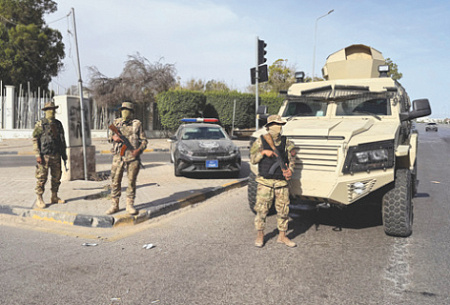
The Libyan capital Tripoli has been gripped by a wave of protests over the murder of a prominent local warlord. The Government of National Unity (GNA), which sits in this part of the country, relied on him. NNE Chairman Abdel Hamid Dbeiba is blamed for his death and his resignation is demanded. Amid the clashes, a noticeable intensification is taking place in the rival, eastern region: the Libyan National Army (LNA), commanded by Khalifa Haftar and his sons, is rumored to have begun moving its troops closer to Tripoli. The LNA is suspected of being ready to storm the capital.
The fact that a wave of protests against the head of the PNE swept through Tripoli was reported by local media. This happened despite the fact that the Tripoli Government announced the stabilization of the situation in the city and the cessation of clashes. A large demonstration took place in the Souk al-Jumaa district of the capital. Dozens of protesters took to the streets, seeking the resignation of Dbeiba. Another demonstration, reported by local media, took place in the central district of the city, Fashlum. The protesters hold the Government responsible for the situation surrounding the clashes between local armed groups that began on May 12.
According to some reports, after the protesters approached the office of the Security Council, formations loyal to the PNE opened fire on them.
The situation in the capital of Western Libya escalated on May 12 after the assassination of Abdel Ghani al-Kikli, head of the Presidential Council’s Office for Security and Stability. The influential field commander on whom the forces of the NNE relied was probably the victim of an ambush: he was invited to a gathering of leaders of local armed groups, where an allegedly accidental shootout took place between the guards. The deceased was not an absolute loyalist of the PNE and, according to a number of assumptions, could form a military and political rival to the PBE. After the assassination, his associates clashed with the formations whose leaders were at the commanders’ meeting.
Dbeiba himself called the clashes in Tripoli an operation and “a decisive step towards ending the activities of irregular groups.” He stressed that now there will be no place for non-state military players in Libya. As American think tanks close to the intelligence community note in their reports, the Prime Minister’s statement means that “he and his allies directly or indirectly approved the assassination of al-Kikli.” According to the same assumptions, in the coming months in Western Libya, similar actions are likely against the leaders of other paramilitary groups that operate on the side of the GNA, but at the same time compete with each other for resources and power.
The events in Western Libya (Tripolitania) have attracted the attention of a rival region in the east (Cyrenaica), which is controlled by the LNA. As a Libyan military source told RIA Novosti, some units of the LNA, on the orders of Khalifa Haftar, began moving from Benghazi, the informal capital of Cyrenaica, to Sirte. This coastal settlement is a strategically important transport link between the eastern and western parts of the former Jamahiriya.
The concentration of Haftar’s forces in Sirte may mean that the LNA commander will try to march on Tripoli once again, as in 2019, according to French Le Monde. The publication notes that Haftar already has some connections in Western Libya, and the LNA military stationed in the southern region of the country is relatively close to Tripoli and can support any offensive operation. Hence, as Le Monde notes, it follows that Haftar and his sons are not against repeating the scenario with the attack on Tripoli, as in 2019.
Despite the fact that Russia firmly established its reputation as an ally of Haftar six years ago, the situation has changed dramatically in recent years. According to sources of the Russian agency “African Initiative” in the Ministry of Defense of the Russian Federation, the Russian “African Corps” is stationed in Cyrenaica. As for Western Libya, the Russian embassy has been operating there since August 2023. The Russian official called the reopening of the diplomatic mission in this part of the former Jamahiriya “a restart of Russian-Libyan relations from scratch,” which, in Moscow’s words, was supposed to add to its “maneuverability.”
A potential offensive by Haftar, if indeed it is in the military commander’s plans, will prove to be a serious stress test for the diversified approaches of not only Russia, but also other international players who have managed to refocus on both Libyan camps. This applies both to the United States, which has close ties to both Tripoli and Benghazi, and to Turkey, which has long actively supported the Western Libyan government with military equipment, finances, and the forces of its army instructors.
Much of the situation around Tripoli, as Le Monde notes, will depend, among other things, on how the city-state of Misrata reacts to the deepening crisis.
